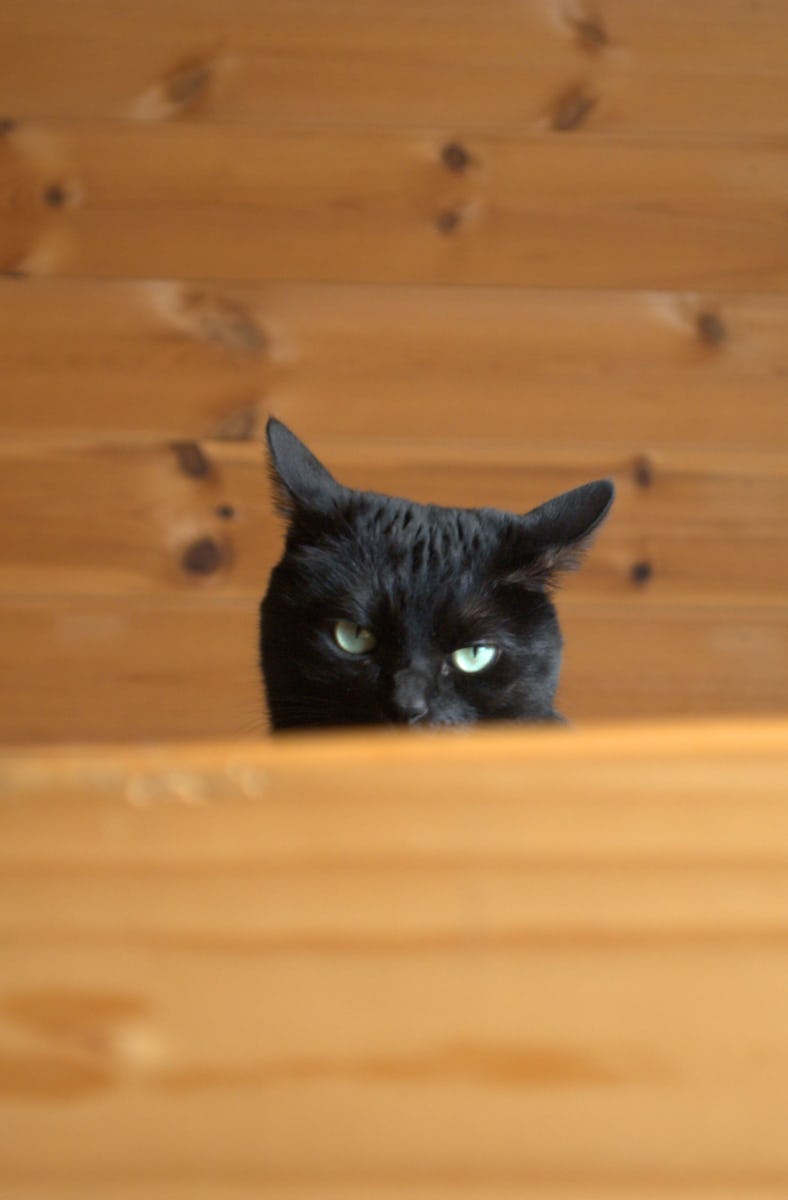Why Is My Cat Staring At Nothing? Inside Your Cat's Unsettling, Blank Gaze
It may look like your favorite feline is zoning out, but there's more going on than our human senses even realize.

Many times throughout the day your cat’s facial expression may go blank as they seem to endlessly fixate on an empty corner. But your favorite feline isn’t just zoning out — in fact, there’s more going on than we realize.
Malini Suchak, an anthrozoology professor at Canisius University in New York, teases out what is exactly capturing your cat’s senses.
What is my cat looking at?
No, your home isn’t haunted and your cat isn’t communing with spirits. What’s likely happening is that your furry feline saw or heard something for less than a second, but even that was enough to get — and keep — their attention. They might not even be looking at anything, but are instead listening for sounds imperceptible to us and just looking off into space as they concentrate.
Cats register shadows, flashes of light, buzzing, and tones that escape human senses. Regarding sight, cats’ modest color vision is “actually a trade-off with night vision,” Suchak says. What their retinas lack in hue-sensing cones they make up for in rods, the photoreceptors that enable vision in dim light. This visual mix creates high contrast between light and shadow and is an excellent hunting tool as these carnivores gallivant around sunrise and sunset.
“Contrast is more important than color per se because they might be hunting at dawn or dusk,” Suchak says. “And their prey are not necessarily brightly colored, except for some songbirds.”
As for hearing, cats pick up ultrasonic sound which exceeds audible frequencies. Humans can only hear as high as 20,000 hertz while cats can hear up to 64,000 Hz. Suchak also says that cats can hear at a lower volume. Where humans can hear high and low sounds if they’re loud enough, cats can pick them out at lower decibels. They can even hear the cockroaches in your walls, Suchak says, which a.) gross and b.) likely sounds “like a scritching noise” to your cat.
Why is my cat looking at nothing for so long?
This behavior hearkens back to their prey-stalking instinct. Cats are ambush predators, so they don’t immediately charge after their target. “When they detect something that might be prey, they should wait and see before chasing,” Suchak says. “Then once they do chase and it disappears, they should wait it out.” Anyone who’s seen a mouse knows how they silently flash by, so cats have evolved to register these subtle movements, and patiently track that spot when the rodent inevitably ventures out.
That also means cats tune into sounds and sights of no importance to us. For example, Suchak noticed her cat “always staring at this one spot at a certain time of night” until one day she realized it was a gap in the curtains that revealed a flash of light of a passing car. “It just looked like he was staring at the same part of the wall all the time,” Suchak says, but in his mind he was “monitoring it to see if that was gonna come back.”
Is it good for my cat to do this?
Happy, healthy kitties receive a good dose of physical and mental stimulation every day, especially if it taps into their instincts. “I think things that stimulate their natural tendencies are often in the ‘good’ category,” Suchak says, calling it a kind of enrichment. Plus, she adds, if your cat is exercising predatory skills by homing in on a mysterious sound, then your pet isn’t using them to pounce on your unsuspecting toes.
But if your cat obsesses over these fixations to the point that it disrupts their typical healthy behavior, that’s a cause for concern. While some stimuli are good, too much can create unhealthy stress. “Finding that perfect sweet spot can be a little tricky,” she says. In Suchak’s case, she switched to light-blocking curtains because she didn’t want her cat to be “tortured by the light that was flickering through all night.” Basically, if they’re fixating on these spots so much that they’re not resting, playing, grooming, or socializing as usual, that’s a signal to investigate with a vet.
But don’t fret about whether your cat lives in a bustling city or quiet rural area because an evolutionary strategy for all animals is the ability to “filter out stimuli that are irrelevant to you,” Suchak says. A city cat should will disregard everyday noise and lights while a farm cat will deal with a bright light. However, “cats that have a history of being outdoors actually have better distance vision than cats that have been indoor-only their whole lives,” she says. This is because outdoor cats need to be aware of threats, while indoor cats’ don’t need the same awareness.
So, there’s more going on behind that black, unsettling gaze — and it’s all thanks to your kitty’s superhuman senses. “So many animals see, hear, smell stuff that we just are completely unaware of,” Suchak says. “It’s easy to look a little nuts.”